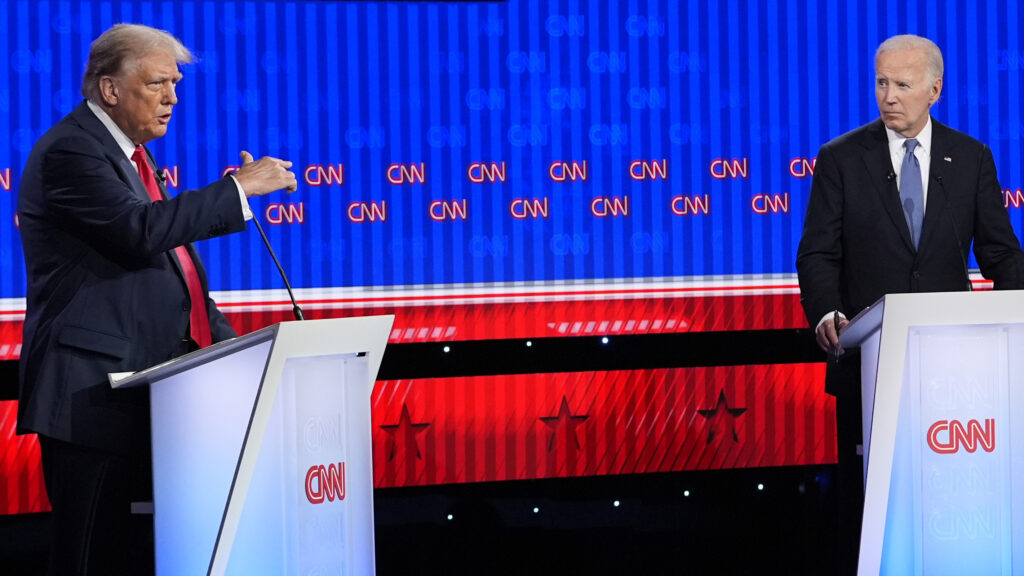The first sign of trouble came before the debate even started.
“Folks, how are you?” President Joe Biden said as he shuffled onto the stage. His voice was raspy and thin, his movements stiff. “Good to be here. Thank you.”
It was an inauspicious glimpse of what would become a historic night. The first and last debate between Biden and Donald Trump started a chain reaction leading to Vice President Kamala Harris replacing Biden at the top of the Democratic ticket. She’ll have her own chance in the spotlight Tuesday as she meets Trump in another debate. She’s been hunkered down to prepare with her team, intent on maintaining the momentum that’s breathed new life into Democrats’ chances this year.
Trump, in a recent interview with a New Hampshire radio host, said he was prepared to face Harris after his encounter with Biden.
“He was not good,” Trump said. “I hope she’s not going to be good, too.”
A look back at the June 27 debate holds lessons for Harris and warnings for Trump, whose rambling and occasional incoherence was overshadowed by Biden’s stumbles.
The first hurdle is understanding the optics of the event.
Optics are important in debates
Ever since Richard Nixon lost the first televised presidential debate to John F. Kennedy in 1960, political experts have treated them like visual spectacles. Biden looked pale onstage and he appeared dazed, his mouth slightly agape, when Trump was talking.
“This is an Instagram, Facebook, TikTok society,” said Michael LaRosa, a former spokesperson for first lady Jill Biden. “Visuals matter.”
LaRosa said Harris needs to be poised at all times because images of her reacting to Trump’s comments can be as potent as when it’s her turn to talk. Her presentation will be closely scrutinized because she’s less well-known than Trump’s, meaning that Americans are still making up their minds about her.
Biden also struggled to make a lucid case for his platform or land solid attacks on Trump.
For example, during a question about the economy, Biden started talking about how the country could invest in education and social services if there were higher taxes on the wealthy. But he lost his train of thought and glanced down at his lectern. When he looked up, he inexplicably said, “Look, we finally beat Medicare.”
He was out of time. “Thank you, President Biden,” said Jake Tapper, one of the moderators.
As the camera caught Biden looking confused by his own answer, Trump pounced. “He beat it to death. And he’s destroying Medicare.”
Biden mangled his answers
The next topic was abortion, a galvanizing issue for Democrats after the U.S. Supreme Court overturned Roe v. Wade.
Trump spoke first, claiming that eliminating the national right to abortion was “something that everybody wanted.”
“Every legal scholar, throughout the world, the most respected, wanted it brought back to the states. I did that,” he said. “Now the states are working it out.”
The answer was false and evasive, as Trump tried to simultaneously take credit for the anti-abortion movement’s historic victory and dodge anger over the result.
Biden’s response started succinctly.
“It’s been a terrible thing what you’ve done,” he said, adding that it was “ridiculous” to suggest there was a consensus around getting rid of Roe v. Wade. Biden said Trump’s view was like saying that “we’re going to turn civil rights back to the states, let each state have a different rule.”
Then Biden veered off in an unexpected direction, perhaps prompted by Trump’s support for exceptions to abortion bans if a woman is raped. He brought up Trump’s concern about crimes committed by migrants, then said that “there’s a lot of young women who are being raped by their in-laws, by their spouses, brothers and sisters.”
“And when those women get pregnant, they can do nothing about it,” Biden said. “And they try to arrest them when they cross state lines.”
Paul Begala, a veteran Democratic strategist, described Biden’s answer as bizarre.
“He took his strongest issue,” meaning abortion, “and talked about his weakest issue,” border security.
Democratic panic started early
They were 15 minutes into a 90-minute debate and, Begala said, “My phone was exploding with texts from other Democratic strategists who were saying, ‘Oh my God, it’s over.’”
After Biden tripped over an answer on immigration, Trump responded with mockery.
“I really don’t know what he said at the end of that sentence,” he said. “I don’t think he knows what he said either.”
While the debate was still underway, the White House said Biden was suffering from a cold. And in the days afterward, Biden said he had been dealing with jet lag from overseas travel.
But the damage was done. Biden had already been struggling to convince voters that he could serve as president until he was 86, which was how old he would be at the end of a second term. Now he had seemingly confirmed the country’s worst fears about his fitness for office.
Begala said Harris’ relative youth — she turns 60 next month — is an enormous benefit, particularly when Trump is 78.
“Every day that she wakes up and she’s not 81, she’s a break with Biden,” he said.
Trump provides no shortage of vulnerabilities in debates. He’s forceful but hyperbolic and frequently dishonest. Sometimes he rambles about his grievances, which might entertain his faithful fans at political rallies but is a poor fit for a one-on-one debate.
Former President Bill Clinton had his own advice for facing off with Trump — show that he’s only out for himself.
“The next time you hear him, don’t count the lies, count the I’s,” he said at the Democratic National Convention.
(AP)











